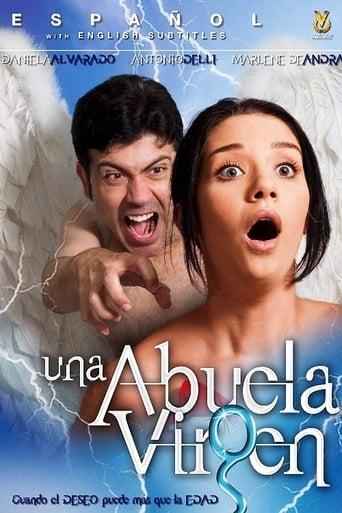



In truth, there is barely enough story here to make a film.
View MoreThere are moments that feel comical, some horrific, and some downright inspiring but the tonal shifts hardly matter as the end results come to a film that's perfect for this time.
View MoreIt really made me laugh, but for some moments I was tearing up because I could relate so much.
View MoreThere are moments that feel comical, some horrific, and some downright inspiring but the tonal shifts hardly matter as the end results come to a film that's perfect for this time.
View MoreThe very successful Venezuelan playwright Rodolfo Santana, whose readership for the most part is from Latin America, has had a good many of his works enacted as popular productions, both upon the stage and for television. This film, based upon his drama "Rock para una Abuela Virgen", unfortunately displays the same flaws as does the original piece, its plot line additionally having suffered numerous weaknesses with the transposition, although its broad range of melodramatic occurrences has borne fruit as a commercial venture in Venezuela, where its action is set. Caracas director Olegario Barrera found the play to be creditable, as he has shown affection for "magical realism", the Latin American literary genre singularly in evidence within the output of Gabriel Garcia Marquez, and it is that type of fantasy element that is omnipresent in this film that includes within its plot such ingredients as a leading character who returns from the dead, and a very tenacious angel sent to earth upon a special assignment. Action in the melodrama opens as Alirio Guaramato (Iván Tamayo), an underesteemed trumpet player, who earns his living performing with a salsa band at the El Sarao night club in Caracas, has fallen into a despondent and drunken state due to the death of his best friend, Chucho, but nonetheless somehow manages to hit a chord, while playing upon his balcony, that has been chartered for the use of heavenly cherubim, to be employed for waking the dead upon Judgment Day. Since Alirio lives across from a cemetery, stone seals there burst at a "Garcia" family tomb, from which wanders beautiful young 20 year-old Antonieta (Daniela Alvarado), who had died two decades prior at the age of 85, and who is now ready to consort with her granddaughter Monica (Marlene De Andrade) who is apparently eight years older than her grandmother, and additionally pregnant by her married lover who intends to abandon her along with their unborn child. God the Creator, displeased with these events, delegates an archangel named Jazzaboalnitanken, "Jazz" for short, (Antonio Delli) to restore Universal Order to the Universe. Jazz adopts the body of the deceased Chucho and drops in to visit with an astonished Alirio, the latter a next-door neighbour to Monica. Because Jazz is forbidden from killing Antonieta for the purpose of restoring her to her family's burial vault, he must persuade Alirio to murder her. However, since the freshly virginal grandmother (abuela) completely enjoys her new state of well-being while remembering all of her past life, she has no desire to return to the land of the dead, and romantic but flimsily complex entanglements ensue. This is the fifth feature film for Barrera, who has been primarily at the helm of television dramas, and his first in 15 years, during which span he was employed as a university instructor in addition to being Director General of Dramatic Programming for RCTV (Radio Caracas Television). UNA ABUELA VIRGEN has been a very popular work throughout Venezuela, and was also a hit at the 2008 Chicago Latino Film Festival, where audiences admired its clever segments, although these have not been enough to bring about artistic success, largely due to its peculiar narrative line. Shot in 1/85:1, the film benefits from Trina Medina's scoring that is highlighted with her performance of "To Live" (I Just Need Little Things). However, the scenario is for the most part absurd, and not helped by Barrera's tendency to lose pacing through his fondness for utilizing characteristics of television situation comedy, with which he is thoroughly familiar. Continuity and logic too often go begging, such as when Antonieta and Monica are seen with changes of clothing that cannot be accounted for by the storyline. The characters often discuss socio-political topics in the guise of women's issues, for no readily apparent reason, while religious faith and dogma, life's meaning, and love, are intermittent subjects as well. The film is an attempt to stimulate within some viewers an awareness of the hoary conundrum: "What would I do if I were born again?" Despite substantial post-production cutting, the piece will seem overlong to some viewers. It has been released upon a Vene Vision DVD that offers fine audio and visual quality, as well as largely accurate English subtitles.
View More